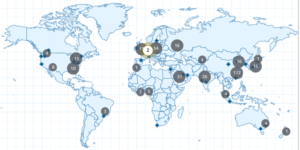
[ad_1]
#2 Regulation
AI might be crucial to our financial future, enabling present and future generations to reside in a extra affluent, wholesome, safe, and sustainable world. Governments, the personal sector, instructional establishments, and different stakeholders should work collectively to capitalize on AI’s advantages.
If not developed and deployed responsibly, AI methods may amplify societal points. Tackling these challenges will once more require a multi-stakeholder strategy to governance. A few of these challenges might be extra appropriately addressed by requirements and shared greatest practices, whereas others would require regulation – for instance, requiring high-risk AI methods to bear skilled danger assessments tailor-made to particular functions.
Many nations and worldwide organizations have already begun to behave — the OECD has created its AI Coverage Observatory and Classification Framework, the UK has superior a pro-innovation strategy to AI regulation, and Europe is progressing work on its AI Act. Equally, Singapore has launched its AI Confirm framework, Brazil’s Home and Senate have launched AI payments, and Canada has launched the AI and Information Act. In the US, NIST has printed an AI Danger Administration Framework, and the Nationwide Safety Fee on AI and Nationwide AI Advisory Council have issued experiences.
Understanding the long run function of gen AI inside banking can be difficult sufficient if rules had been pretty clear, however there may be nonetheless quite a lot of uncertainty. In consequence, these creating fashions and functions must be aware of fixing guidelines and proposed rules.
We work with policymakers to advertise an enabling authorized framework for AI innovation that may help our banking clients. This contains advancing regulation and insurance policies that assist help AI innovation and accountable deployment. Additional, we encourage policymakers to undertake or preserve proportional privateness legal guidelines that shield private info and allow trusted knowledge flows throughout nationwide borders.
For the previous few years, federal monetary regulatory companies all over the world have been gathering perception on monetary establishments’ use of AI and the way they may replace current Mannequin Danger Administration (MRM) steering for any sort of AI. We shared our perspective on making use of current MRM steering in a weblog publish earlier this 12 months.
Within the US, the Commerce Division’s Nationwide Institute of Requirements and Expertise (NIST) established a Generative AI Public Working Group to supply steering on making use of the prevailing AI Danger Administration Framework to handle the dangers of gen AI. Congress has additionally launched varied payments that handle parts of the dangers that gen AI would possibly pose, however these are in comparatively early phases.
Some challenges might be addressed by regulation, making certain that AI applied sciences are developed and deployed consistent with accountable business practices and worldwide requirements. Others would require elementary analysis to higher perceive AI’s advantages and dangers, and handle them, and growing and deploying new technical improvements in areas like interpretability. And others could require new teams, organizations, and establishments – as we’re seeing at companies like NIST.
We additionally imagine that sectoral regulators are greatest positioned to replace current oversight and enforcement regimes to use to AI methods, together with on how current authorities apply to using AI, and exhibit compliance of an AI system with current rules utilizing worldwide consensus multistakeholder requirements just like the ISO 42001 collection. Within the EU, there are enabling mechanisms to instruct regulatory companies to situation common experiences figuring out capability gaps that make it troublesome each for lined entities to adjust to rules and for regulators to conduct efficient oversight.
[ad_2]
Source link





